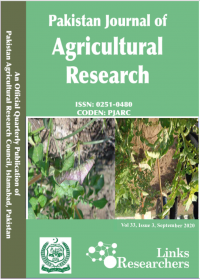Efficacy of Exogenous Applications of Glucose in Improving Wheat Crop (Triticum aestivum L.) Performance under Drought Stress
Efficacy of Exogenous Applications of Glucose in Improving Wheat Crop (Triticum aestivum L.) Performance under Drought Stress
Muhammad Zahid1, Naeem Iqbal1, Sohaib Muhammad2*, Summiya Faisal3, Wajid Mahboob3, Makhdoom Hussain4 and Zaheer ud din Khan2
ABSTRACT
Restriction in crop growth and yield occurs when it encounters extreme water shortage. In order to reduce the adversities of drought, glucose was exogenously applied at various phenological stages on wheat variety “AARI-11” and desiccation tolerance potentials were assessed through growth, yield and physiological attributes. Glucose was supplied in various concentrations (0, 5, 10, 25 and 50 mM) as seed priming and foliar spray treatments at vegetative and reproductive stages. Plant growth and grain yields were reduced under drought. Two glucose treatments (10 mM and 50 mM) improved tillering and dry biomass as compared to other treatments. Foliar sprayed-glucose treated plants showed increasing trends in grain yield under drought. Physio-chemical attributes were also modulated by exogenously applied carbohydrates. Nitrate reductase activity and total soluble proteins were increased with increase in sugar treatments under drought. Osmotic and water potentials were reduced under drought but foliar glucose sprays of 10 mM and 50 mM applied at reproductive phase significantly reversed the adverse effects of drought. Gas exchange characteristics including CO2 concentration, transpiration and photosynthesis rates were raised by glucose treatments under irrigated and non-irrigated conditions. Hence, drought tolerance was slightly induced by exogenous glucose doses in terms of improved growth, yield and physiological traits.
To share on other social networks, click on any share button. What are these?






